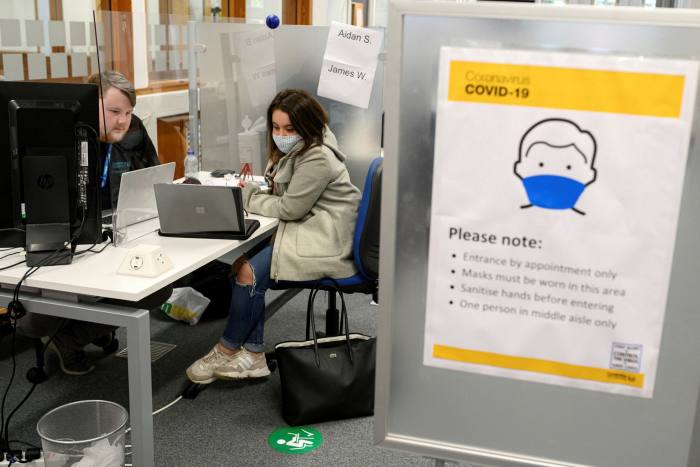[ad_1]
Universities in England face a wave of departmental closures and job cuts as the financial pressures of the pandemic and a government drive to focus more on vocational education forces widespread restructuring.
Arts and humanities courses at dozens of mid-ranking universities are expected to bear the brunt of potential cuts that could affect thousands of staff, according to analysts and the sector’s main union.
The University and College Union, which represents more than 130,000 academics and support staff in the UK, is involved in a handful of formal disputes and negotiations that it described as “early skirmishes†ahead of what it fears are more drastic cuts. It has pledged to fight “unnecessary†redundancies that could cause “long-term damage†to the sector.
The tension hints at a wider reckoning in higher education, as a government sceptical of mass university enrolment moves to “rebalance†the focus from academic to vocational learning.
Ministers are expected to announce policy changes later this year, which are heavily influenced by the findings of a 2019 review of all post-18 education by businessman Philip Augar that sought to rebalance resources between higher and further education.
After a decade of rapid expansion in a sector dependent on student fees, some universities saddled themselves with debt as they expanded in a bid to grow undergraduate numbers.
“Unless there’s a complete about turn it’s going to be very difficult. Once we get the response to Augar, I would expect there’s going to have to be some really serious change,†said Professor Adam Tickell, vice-chancellor of Sussex university.
“I wouldn’t be surprised if we start seeing university mergers and much stronger partnerships with further education colleges,†he added.
Despite dire warnings at the beginning of the coronavirus pandemic, international and domestic student numbers hit record highs this year.

But growth was unevenly distributed and many institutions with precarious finances, particularly those outside the research-intensive Russell Group and those that achieved university status after 1992, suffered falls in enrolment.
Universities UK, which represents 140 institutions, said its members had spent more than £600m adapting to the pandemic and many had also lost upwards of £10m each through rent refunds, as students were forced to study from home.
Dr Gavan Conlon, an education specialist at consultancy London Economics, said coronavirus had “exacerbated†financial insecurities, with about 20 to 30 institutions lacking the liquid assets to cover current shortfalls.
Institutions with already narrow operating surpluses, which average about 4 per cent, or £8m, have been squeezed further, according to Conlon.
“Any further reduction in income is going to result in a cut in expenditure. This means that there’s going to be job losses straight off the bat . . . In some cases, that’s going to mean entire departments shutting down,†he said.
Vicky Blake, University and College Union’s president, said the disputes and negotiations the union was involved in were “the tip of the icebergâ€. Its members have voted to strike at Leicester university, where negotiations resulted in compulsory redundancies being cut from 60 to 26 in fields such as critical management studies and medieval literature.
Leicester university said the cuts would allow it to build on “core strengths†but the union accused it of slashing world-renowned research to make way for courses it saw as commercially lucrative.
After talks with the union, Aston University in Birmingham called off plans to discontinue history courses, saving some jobs, but cuts to modern languages will still go ahead.

Blake said she was “deeply concerned that the Covid crisis has been used by some employers as a veil under which to pursue unnecessary cuts and restructures.â€
She blamed England’s market-driven model, where universities compete to attract students and tuition fee funding, for leaving some in a precarious position. “We could be looking at many thousands of jobs at risk,†she said.
Nick Hillman, head of the think-tank Higher Education Policy Institute, said the pandemic had pushed universities to “try to be a little bit less of all things to all people†and rationalise courses “less central†to their vision. “It’s exposed underlying weaknesses and sped up changes that would have happened anyway,†he said.
At Solent University in Southampton, some 80 staff, or about 8 per cent of the workforce, have taken voluntary redundancy as part of a five-year strategy to expand areas such as health and nursing while cutting business courses.
Professor Karen Stanton, the vice-chancellor, said the changes were necessary to offset the strain on finances from the pandemic and problems recruiting students, which has pushed the university into deficit.
“It’s an increasingly competitive market . . . It’s all about establishing our place in the market in the subject areas that we offer,†she said.

The impact of Covid-19 has been compounded by government cuts to research funding after Brexit, while universities also face an increase in contributions to cover the rising deficit in the sector’s main pension scheme.
The government has offered limited financial support during the pandemic and has told any university facing insolvency that it must submit to an onerous “restructuring regime†to qualify for support. So far, no institution has gone down that route.
Universities fear the expected change to government policy would make their problems worse, as ministers shift resources to vocational training. Options under consideration include lowering the tuition fee cap and introducing minimum grade requirements, which would significantly dent university finances, according to senior management at three universities.
Universities UK said a freeze to the fees cap, in place since 2018, was already putting financial pressure on the sector.
Professor Graham Galbraith, vice-chancellor of Portsmouth university, said the bigger danger to universities was a “utilitarian†government view that they existed only to train workers in “skills the government decides are neededâ€.
“Our broader role in producing well-rounded graduates . . . is being lost,†he said.
[ad_2]
Source link





